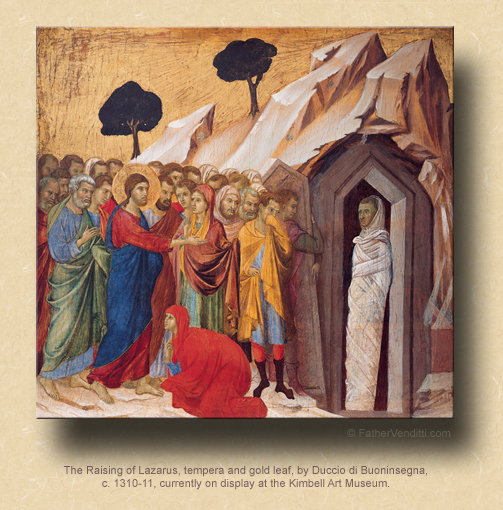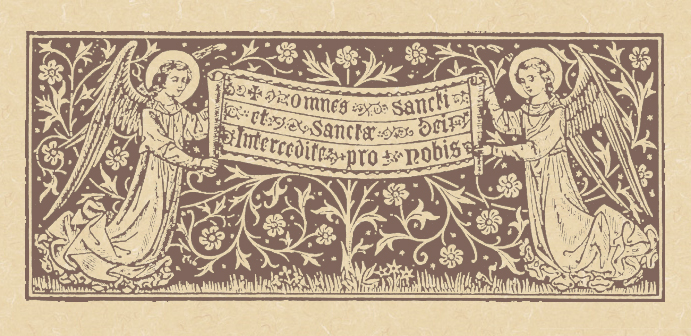The One Thing Necessary.
The Memorial of Saint Martha.
Lessons from the proper, according to the ordinary form of the Roman Rite:
• I John 4: 7-16.
• Psalm 34: 2-11.
• John 11: 19-27.
[…or, Luke 10: 38-42.]
|
…or, first & second lessons from the primary feria for the 17th Monday of Ordinary Time:
• Exodus 32: 15-24, 30-34.
• Psalm 106: 19-23.
…or any from the common of Holy Men & Women, the third lesson from the proper being required.
|
The Third Class Feast of Saint Martha, Virgin; and, the Commemoration of Saints Felix, Simplicius, Fautinus & Beatrice, Martyrs.*
First & second lessons from the common "Dilexísti…" for a Virgin, third from the proper, according to the extraordinary form of the Roman Rite:
• II Corinthians 10: 17-18; 11: 1-2.
• Psalm 44: 5, 15-16.
• Luke 10: 38-42.
|
If a Mass for the commemoration is taken, lessons from the common "Sapiéntiam…" for Many Martyrs:
• Wisdom 5: 16-20.
• Psalm 123: 7-8.
• Luke 6: 17-23.
|
FatherVenditti.com
|
 10:56 AM 7/29/2019 — The Missal gives us two options for the Gospel lesson on the Memorial of Saint Martha, neither one of them flattering to her. One is the scene from John in which our Lord, having purposely delayed going to visit his friend, Lazarus, is scolded by Martha for not arriving sooner (John 11: 19-27), and the other the one I just read. I chose the passage from Luke because it is the quintessential statement of the interior life for the Christian. 10:56 AM 7/29/2019 — The Missal gives us two options for the Gospel lesson on the Memorial of Saint Martha, neither one of them flattering to her. One is the scene from John in which our Lord, having purposely delayed going to visit his friend, Lazarus, is scolded by Martha for not arriving sooner (John 11: 19-27), and the other the one I just read. I chose the passage from Luke because it is the quintessential statement of the interior life for the Christian.
I don’t know about you, but I’ve been purposely avoiding television during this politically charged time, as watching politicians give speeches just makes me angry inside, so what’s the point? You’d be surprised how many people actually believe that they have some sort of moral obligation to watch the news. Whenever someone comes into confession and complains that watching the news gets him or her angry and disturbs his peace of mind, I just tell him to turn it off. It’s like the old joke about the man who goes into the doctor’s office and complains, “Doctor, it hurts when I do this,” to which the doctor replies, “Don’t do that, then.”
Martha, Martha, sollicita es, et turbaris erga plurima, porro unum est necessarium. I have an affinity, as you know, for Msgr. Knox’s translation: “Martha, Martha, how many cares and troubles thou hast! But only one thing is necessary…” (Luke 10: 41-42 Knox).
The Gospel lesson I did not read is, of course, the conversation our Lord has with Martha prior to raising her brother from the dead; and, you may remember that, after this, so many people came to believe in our Lord that it caused great concern among the Jewish authorities. It was, in fact, the beginning of this discussion among the Jews that culminates in the decision that Jesus must be done away with; and, in the following chapter, it is explicitly stated that the plot against our Lord was expanded to include the killing of Lazarus, too, because his existence testified to our Lord’s divinity (cf. John 12: 10-11); and, it’s not much of a stretch to suppose that his two sisters would have been targeted as well. In fact, there is a tradition in the Church, still reflected in the breviary of the extraordinary form, which expands on this idea:  it states that, following our Lord’s ascension, Martha, Mary and Lazarus were arrested by the Jews and put into a boat without sail or oars to perish on the sea, but which was conveyed, by means of a miracle, to the harbor of Marseilles in the south of France. There they preached the Gospel and converted many to Christ, with Martha in particular being admired for her holiness and charity, performing many miracles, and finally ending her days in monastic seclusion after an honorable and long life. it states that, following our Lord’s ascension, Martha, Mary and Lazarus were arrested by the Jews and put into a boat without sail or oars to perish on the sea, but which was conveyed, by means of a miracle, to the harbor of Marseilles in the south of France. There they preached the Gospel and converted many to Christ, with Martha in particular being admired for her holiness and charity, performing many miracles, and finally ending her days in monastic seclusion after an honorable and long life.
It’s all very fanciful and probably not true, but I’ve often wondered why the Church had—and still has—a feast honoring Saint Martha, and none to honor either of her two siblings. Mary, after all, was the one who chose the better part (cf. Luke 10: 42), and who anointed our Lord’s feet with perfumed oil, much to the chagrin of Judas who thought it was a waste (cf. John 12: 1-8). Maybe it’s because the Church understands that most of us aren’t Mary, even though we’d all like to be. All of us, I think, would like to step away from the worries and concerns of life and just sit at our Lord’s feet, contemplating holy things; but, the fact is that most of us are more Martha than Mary, “anxious and worried about many things” (Luke 10: 41 NABRE). Agitation in the soul is the failure to cultivate the virtue of Hope, and maybe it’s to our benefit to know that even the greatest of saints struggled with it. Let’s ask for Martha’s intercession, that we might find peace of mind in the practice of that virtue; and, even though Martha may be what we are, she lives with her sister Mary always at her side, to admire and one day imitate in the pursuit of that one necessary thing.

* Pope Saint Felix fought courageously against the Arian heresy and was martyred in 492. Simplicius, Faustinus and Beatrice, three siblings, suffered martyrdom under Diocletian in 302.
|

